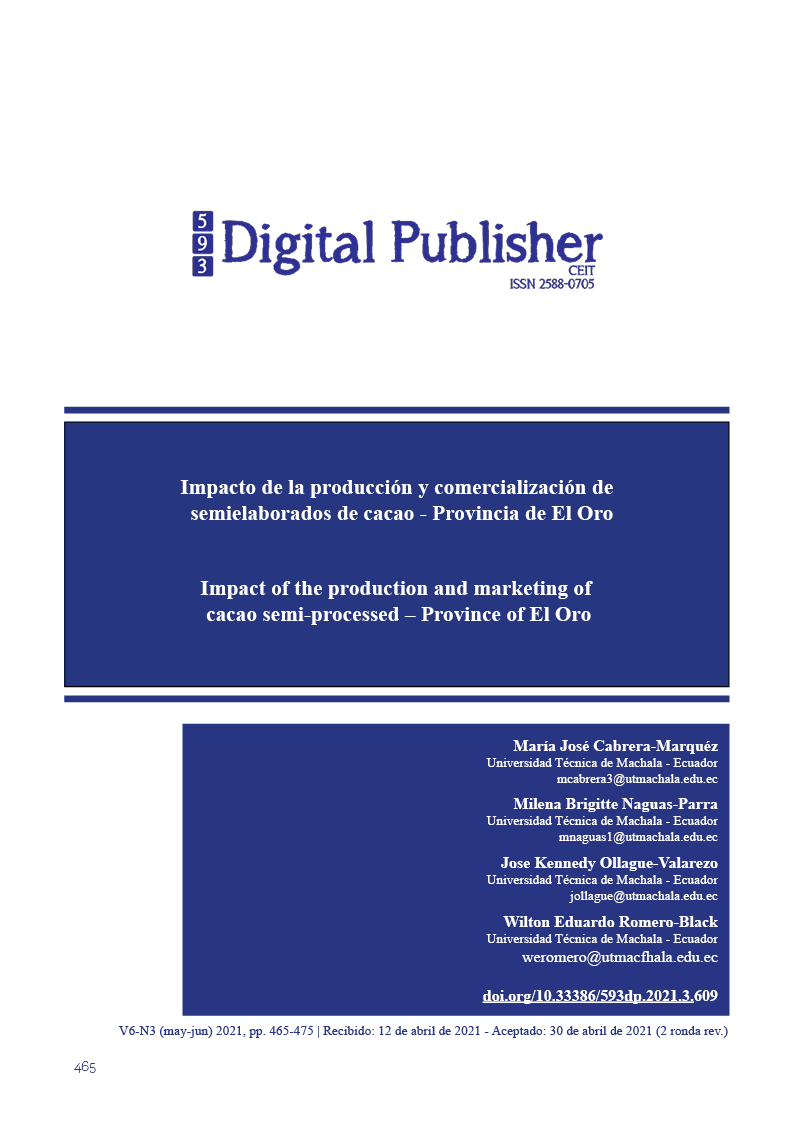El Impact of the production and marketing of cacao semi-processed – Province of El Oro
Main Article Content
Abstract
The purpose of this research work is to determine the impact on the production and commercialization of cocoa semi-finished products on the socioeconomic development of the province of El Oro; For which, the descriptive method is applied with which it is possible to expose the current situation of the sector, in addition it is possible to give answers of real data, through a survey applied to 300 producers at the provincial level in which it was determined that, the Ignorance and lack of support by the authorities leave as a result an important group of producers who choose to sell cocoa beans, and very few who take advantage of their cocoa crops to make products derived from this fruit. In addition, it was possible to identify a categorization table according to the level of complexity (<a> complexity) of the semi-finished products that are made within the province of El Oro by small groups of entrepreneurs.
Downloads
Article Details

This work is licensed under a Creative Commons Attribution-NonCommercial-ShareAlike 4.0 International License.
1. Derechos de autor
Las obras que se publican en 593 Digital Publisher CEIT están sujetas a los siguientes términos:
1.1. 593 Digital Publisher CEIT, conserva los derechos patrimoniales (copyright) de las obras publicadas, favorece y permite la reutilización de las mismas bajo la licencia Licencia Creative Commons 4.0 de Reconocimiento-NoComercial-CompartirIgual 4.0, por lo cual se pueden copiar, usar, difundir, transmitir y exponer públicamente, siempre que:
1.1.a. Se cite la autoría y fuente original de su publicación (revista, editorial, URL).
1.1.b. No se usen para fines comerciales u onerosos.
1.1.c. Se mencione la existencia y especificaciones de esta licencia de uso.
References
Anecacao. (2015). Anecacao: Asociacion Nacional de Exportadores de Cacao-Ecuador. Obtenido de Anecacao: Asociacion Nacional de Exportadores de Cacao-Ecuador: http://www.anecacao.com/es/quienes-somos/cacao-nacional.html
Banco Central del Ecuador (Vol. II). (2020). Obtenido de https://contenido.bce.fin.ec/documentos/PublicacionesNotas/Catalogo/Encuestas/Coyuntura/Integradas/etc202002.pdf
Barrezueta, S. (2019). Propiedades de algunos suelos cultivados con cacao en la provincia El Oro, Ecuadr. Ciencia UAT, 14(1), 156-166. doi:doi.org/10.29059/cienciauat.v14i1.1210
Casteblanco, J. A. (2018). TÉCNICAS DE REMEDIACIÓN DE METALES PESADOS CON POTENCIAL APLICACIÓN EN EL CULTIVO DE CACAO. Revista de Ciencias de la Vida, 27(1). doi:https://doi.org/10.17163/lgr.n27.2018.02
Cuellar Amaya, L., & Ovalles Pabón, L. (2017). Chocolate: mas que un dulce. Revista Convicciones, IV(7), 117-126. Obtenido de https://www.fesc.edu.co/Revistas/OJS/index.php/convicciones/article/view/125/178
Diagnóstico del cacao Sabor Arriba. (2005). En UCTAD/Programa de Facilitación del Biocomercio. Obtenido de http://infocafes.com/portal/wp-content/uploads/2016/11/Diagnostico_Cacao_Arriba_Ecuador.pdf
FlacsoAndes. (s/f). Obtenido de https://biblio.flacsoandes.edu.ec/catalog/resGet.php?resId=4439
Guevara , G., Verdesoto, A., & Castro, N. (2020). Metodologías de investigación educativa (descriptivas, experimentales, participativas, y de investigación-acción). RECIMUNDO: Revista Cientifica Mundo de la Investigacion y el Conocimiento, 4(3), 163-173. doi:https://www.recimundo.com/index.php/es/article/view/860
Guevara, G., Verdosoto, A., & Castro, N. (2020). Metodologías de investigación educativa (descriptivas, experimentales, participativas, y de investigación-acción). RECIMUNDO: Revista Cientifica Mundo de la Investigacion y el Conocimiento, 4(3), 163-173. doi:https://www.recimundo.com/index.php/es/article/view/860
Hernández , H., & Pascual, A. (2018). Validación de un instrumento de investigación para el diseño de una metodología de autoevaluación del sistema de gestión ambiental. Revista de Investigación Agraria y Ambiental, IX(1), 157-163. doi:https://doi.org/10.22490/21456453.2186
Hernández Triviño, A. (2013). Chocolate: historia de un nahuatlismo. Estudios de cultura Náhuati(46), 37-87. Obtenido de http://www.historicas.unam.mx/publicaciones/revistas/nahuatl/pdf/ecn46/945.pdf
Mata, D. (2018). Proceso de comercialización del cacao fino de Aroma en la provincia Los Rios, Ecuador. Avances, XX(4), 385-400. Obtenido de http://www.ciget.pinar.cu/ojs/index.php/publicaciones/article/view/389/1354
Merino, E., Pedro Peláez, & Zavala, W. (2018). Influencia de tres sistemas agroforestales del cultivo de cacao en la captura y almacenamiento de carbono. Scientia Agropecuaria, 9(4). doi:http://dx.doi.org/10.17268/sci.agropecu.2018.04.04
Misas, E. (1941). Revista Facultad Nacional de Medellín, IV(13), 1325-1329. Obtenido de https://revistas.unal.edu.co/index.php/refame/article/view/34567/35123
Morales, F., Carrillo, M., Ferreira, J., Peña, M., Briones, W., & Albán, M. (2018). Cadena de comercialización del cacao nacional en la provincia de los Rios, Ecuador. Ciencias Agrarias, XI(1), 63-69. Obtenido de https://doi.org/10.18779/cyt.v11i1.131
Ordoñez, D., Salazar, J., Tapia, N., & Pacheco, A. (2020). Influencia del clima y la satisfacción laboral en el desempeño del talento humano de las empresas comercializadoras. 593 Digital Publisher, 6-1(5), 410-422. doi:https://doi.
Quintero, M., Anido, J., & Azuaje, A. (2017). El consumo de cacao en Venezuela y en el mundo desde una perspectiva sostenible (1960 - 2014). AGROALIMENTARIA, XXIII(45), 23-49. Obtenido de https://dialnet.unirioja.es/servlet/articulo?codigo=6463509
Vergara, E. (2015). Conoce los beneficios del chocolate y disfrútalo sin culpa ni remordimientos. Obtenido de http://www.upsocl.com/comida/conoce-los-beneficios-del-chocolate-y-disfrutalo-sin-culpa-ni-remordimientos/
Vidal Fócil, A. B. (2017). El festival del chocolate como estrategia de promoción del turismo cultural en el estado de Tabasco, MÉXICO. International Journal of Scientific Management and Tourism, III(2), 501-512. Obtenido de https://dialnet.unirioja.es/descarga/articulo/6132934.pdf





